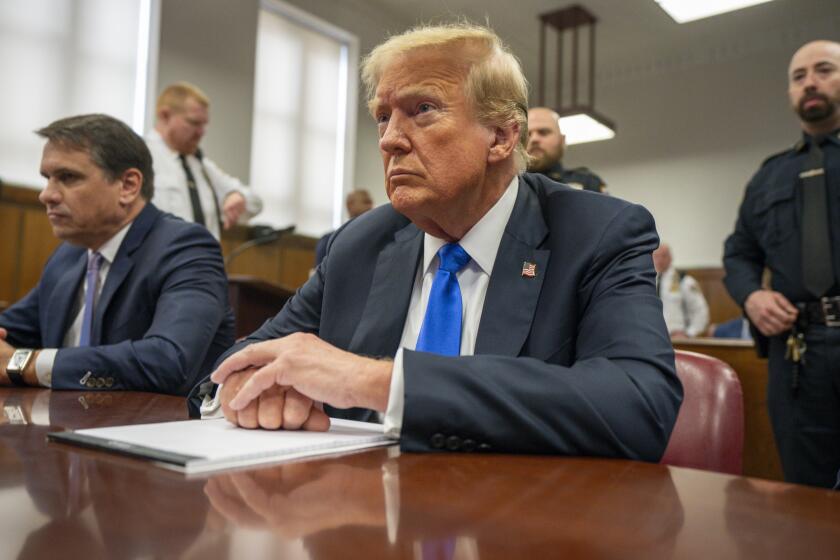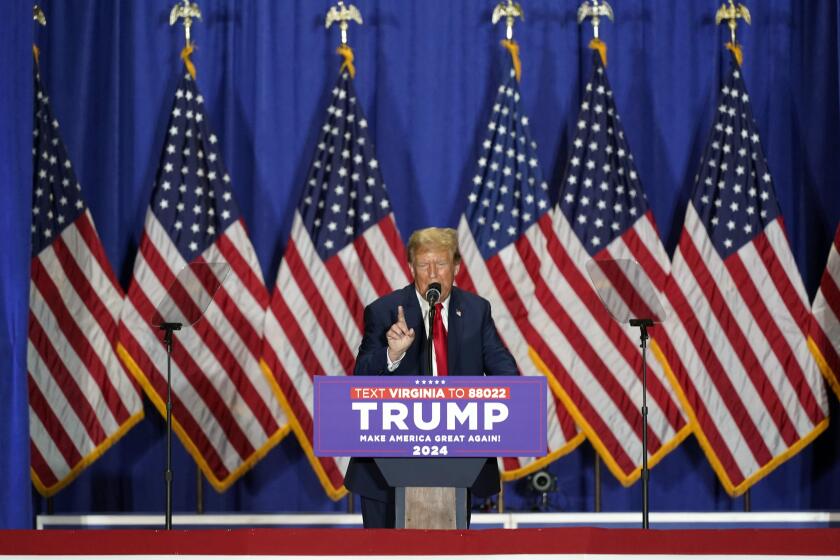Column: Will Trump launch a reign of terror against his list of enemies? There’s little to stop him

- Share via
During his ultimately victorious campaign for the presidency, Donald Trump made no bones about his intention to use the legal levers of government to go after his perceived enemies. When he takes office in January, we should therefore expect him to launch a reign of terror against dozens of people he sees as having crossed him. And his vengeance will be enabled by the Supreme Court opinion granting presidents broad immunity from prosecution.
A recent National Public Radio analysis determined that Trump has threatened more than 100 federal investigations or prosecutions to settle scores. They run the gamut from President Biden and his family, whom the president-elect has promised to pay back on Day 1 of his tenure by appointing a special prosecutor to investigate unspecified crimes; to former Rep. Liz Cheney, whom he recently suggested should face something like a firing squad; to judges involved in his prosecutions; and journalists who refuse to give up their sources.
Granted, Trump frequently gives the impression that he has little understanding of or even interest in many of the policies he pressed on the campaign trail. But retribution against his enemies is clearly something that gets him up in the morning. From well before his entry into politics, Trump has been single-minded in intimidating and exacting retribution against his opponents.
If Kamala Harris wins, the former president faces sentencing in New York, more trials and likely incarceration. But he can make most of it go away with a victory.
A passage from one of his tacky books that was read into evidence at his New York criminal trial declares, “My motto is: Always get even. When somebody screws you, screw them back in spades.”
Trump is in this respect not unique in the annals of the American presidency. The desire to “screw” one’s enemies, a hallmark of the insecure leader, is the impulse that brought down Richard Nixon. Watergate originally sprang from Nixon’s vendetta against Daniel Ellsberg, whom he was determined to embarrass for exposing the Pentagon Papers.
In the wake of Nixon’s abuses, the country put in place a series of laws, regulations and norms designed to prevent government by vengeance. These included a prohibition on White House meddling in Justice Department prosecutions that took on canonical status.
I was a Justice official at the beginning of what became the Whitewater scandal, and it would have been unthinkable at the time for a White House official to try to direct the department to investigate a political enemy. No administration would have dared, and no department official would have acquiesced.
Litman: For the second time in days, the Supreme Court helped make another Trump presidency possible
The justices reversed a Colorado decision disqualifying the ex-president from the ballot under the 14th Amendment. The court is also holding up his Jan. 6 prosecution.
Since Watergate, the only administration that failed to fully respect that principle was Trump’s. His political appointees repeatedly pushed the department to at least provide information about continuing prosecutions. In those difficult years, the department sometimes resisted but sometimes relented. Biden’s attorney general, Merrick Garland, made it a priority to rebuild the wall between the White House and the Justice Department.
Trump has made it clear that he intends to raze that wall in his first days in office. Working off the blueprint of Project 2025, Trump has announced that he plans to hollow out the department’s career staff and replace them with political appointees who will serve at his pleasure and be loyal to him, not the Constitution.
At that point, there will be no real impediment to the use of federal power for revenge against Trump’s long list of enemies. It will be the opposite of the department’s proud aspiration to do “justice without fear or favor.”
Moreover, Trump has said he will rely on the Supreme Court’s immunity opinion to provide full cover against any legal resistance. When asked recently how he would handle special counsel Jack Smith, who led his two federal prosecutions, Trump replied, “It’s so easy — I would fire him within two seconds,” adding that he would enjoy “immunity at the Supreme Court.”
The irony and tragedy of Trump’s invocation of the opinion is that the court declared it was ruling not for Trump but “for the ages.” But it is indeed Trump whose unscrupulous ambition it has served. And while the court reasoned that immunity is needed to safeguard aggressive, nimble and presumably lawful presidential action, Trump takes the lesson that he can violate the Constitution with impunity.
The corrupt use of prosecutorial power can amount to a crime. For starters, the federal code criminalizes conspiring to injure any person because of their exercise of constitutional rights or their race. But the Supreme Court has ensured that Trump could carry out unlawful prosecutions: He can commit crimes but can’t be made to answer for them.
Trump’s retribution agenda may encounter other roadblocks. Grand juries may not go along with prosecutions that reek of vengeance, and trial juries and judges are more likely to resist.
Also, presidential immunity doesn’t extend to other executive branch officials, and Trump will need confederates in the Justice Department to do his bidding. But with a clear Republican majority in the Senate, Trump is likely to get any senior official he wants confirmed. That could include the likes of the right-wing activist and attorney general hopeful Mike Davis, who wrote Wednesday of Trump’s opponents, “I want to drag their dead political bodies through the streets, burn them, and throw them off the wall. (Legally, politically, and financially, of course.)”
As a practical matter, by far the most important protections against vengeful prosecutions are career federal prosecutors’ nonpartisan professionalism and the norms forbidding the White House from telling them whom to prosecute. Trump is plainly fixing to lay waste to those safeguards. That alone would constitute a giant step away from the rule of law and toward autocracy.
Harry Litman is the host of the “Talking Feds” podcast and the “Talking San Diego” speaker series. @harrylitman
More to Read
A cure for the common opinion
Get thought-provoking perspectives with our weekly newsletter.
You may occasionally receive promotional content from the Los Angeles Times.













